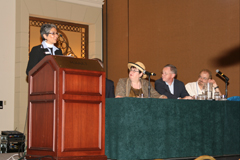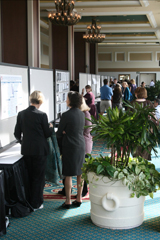Story and photos by Thea Skinner
 |
| Rev. Canon Mary Moreno-Richardson, coordinator for Hispanic Ministry in the Diocese of San Diego speaks as other panelists are attentive during the National Communication Association's 94th Annual Convention, "unCONVENTIONal" at the Manchester Grand Hyatt Hotel in San Diego Nov. 22. |
Dec 1, 2008 (San Diego) — Spirits ran high in higher education during the National Communication Association's 94th Annual Convention at the Manchester Grand Hyatt Hotel in San Diego Nov. 21-24. Titled the "unCONVENTIONal," the convention held concurrent sessions on eight levels of the hotel.
The Nov. 22 Urban Communication Foundation Spotlight Panel session discussed issues pertinent to the region including democratic processes, activism, infrastructure and sustainability--at times sparking heated controversy. The five largest issues affecting the region are growth, borders, water, climate, and economy or housing, said Peter Andersen, professor at San Diego State University's School of Communication and environmental community commentator for Channel 10.
William Eadie, a professor at the university chairing the panel, cited government transparency as key to addressing issue development.
"What are you going to do to create neighborhood networks, so people are talking to each other about issues?" he asked. "Anybody in any profession has a community service obligation; everybody in any profession can say they have too much pressure or too much to do."
Two panelists representing Move San Diego, an organization committed to assisting the region's transportation plan in a sustainable manner, participated. Organization Members participate in senate hearings and give testimonies to city council advocating for a smart growth model to address urban congestion, sprawl and pollution.
The convention came on the heels of a local senate subcommittee meeting held in San Diego the week prior. The meeting included U.S. Senator Barbara Boxer, chair of the Senate Subcommittee on Environment and Public Works. Boxer called for critical investments in infrastructure in October to stimulate the economy.
An audience participant asked what San Diego is doing to engage the public with new media and empower grassroots communication, as another audience participant expressed frustration in holding dialogue with the military community to facilitate issue development.
 |
| Attendees at the National Communication Association's 94th Annual Convention, unCONVENTIONal network near booths at the Manchester Grand Hyatt Hotel in San Diego Nov. 22. |
Vince Hall, political communication lecturer at the university with more than 20 years of experience in campaign and government politics, indicated that regional organizations ranging from political to nonprofit are using social media outlets including Facebook, MySpace, micro-sites and Web sites.
"To me the biggest gap is between government and everybody else. The government enjoys the privacy to make its own powerful decisions in the absence of community involvement by not engaging in these new technology based networks," Hall said. "We have seen it several hundred times... community planning with the same 15 people gathered every single week."
Hall is presently vice president of public affairs and communications for Planned Parenthood of San Diego and Riverside Counties.
"I think we are going to need some sort of statutory priority that forces government to use these technology networks, because government is achieving far too much privacy power as a result of being independent of those networks," he said.
The same sentiment was echoed by Carolyn Chase, Move San Diego co-founder, San Diego Planning Commission member, and chair of the mayor's Environmental Advisory Board.
"Their (government) not interested in engaging in dialogue. They are not interested in negotiating; they are interested in having something come out of the back room that has already been decided on," she said.
She mentioned that planning boards across the nation often hold numerous public meetings on issues that have already been decided.
" have been on citizen advisory committees that have been fixed like that in this region," she said.
She called for "encouraging people to know what their political power is about and how to get into groups," she said. "I tell people asking for help, `Look, politics is a group game." I actively work on trying to break through messages to elected officials; some of them who have been in the same elected position for 20 or 30 years." She added that elected officials are "old, rich, white guys - no offense--I hope there are some women in there."
As the panel discussion concluded, a session titled Analyzing the New Media Landscape: From Blogs to YouTube commenced one floor level above. Communication scholars from about eight universities participated, presenting their findings. For more information visit www.movesandiego.org.
Thea Skinner is a Colorado-based journalist and editor. For more of her writing, visit www.sensiblecommunicator.blogspot.com.







Recent comments